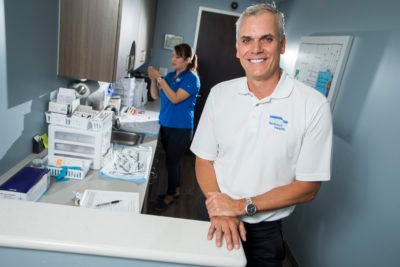By now you’ve heard all kinds of stories about who is to blame for the current healthcare crisis in our country. Fingers can be pointed in a lot of directions, but it’s perhaps more important to focus on understanding the problem, then setting out to find a solution.The problem is quite easy to explain. Healthcare costs are climbing, as are insurance premiums, making care and coverage unaffordable for small businesses and average working Americans (those who make around $30,000 a year). In fact, pre-subsidy premium prices found under the Affordable Care Act easily top $1,600 a month for a typical family. Obviously, that’s not affordable for someone making under $25 an hour. To compound matters, these insurance plans come with high deductibles and cover little until that deductible is met.
“Nobody, unless they’re well north of $20 an hour, can afford to buy health insurance on their own. Even employers don’t know how to make it affordable … we have a solution for that problem,” said David Berg, DC, founder of Redirect Health.
Solving a huge problem
As Berg started his own healthcare practice in the late 90s, with his wife, Janice Johnston, MD, the Canadian transplant was in for a rude awakening when it came to figuring out the American insurance payment system and how to control costs. After early struggles, the couple eventually created a self-funded health plan for their own employees to help control costs and offer a better experience. Employees enjoyed no copays, unlimited primary care and chiropractic visits, all needed labs, as well as preventive and hospital services. One example for how much money they saved came last year. While offering free care to all their employees, they only spent $586,000. Actuaries said the exact same level of benefits should have cost them more than $2.2 million.
Eventually, this idea evolved into a healthcare membership plan known today as Redirect Health, which started offering healthcare (not insurance) to Arizona businesses in 2014. The concept removes insurance companies from the routine care equation completely. These services make up around 90 percent of a typical family’s medical needs in any given year.
Today, under Redirect Health’s EverydayCARE™ plan, for as little as $105 per month, members have no copays, 24-hour telemedicine access, unlimited primary and injury care, free chiropractic and annual preventive exams, labs and immunizations, as well as access to a 24-7 health concierge system, known as Care Logistics. Care Logistics personnel guide members to the best and most affordable care in all situations from the onset of symptoms to office visits to purchasing reasonably priced prescriptions and beyond. Care Logistics team members can even direct you to the best prices (far below insurance rates) for child birth, cancer treatment and more.
“What we offer here is really so much more than primary care,” Berg added.
Since 2014, Redirect Health has grown to 7,000 members and business owners in 43 states. Its mission is simply “Easy and Truly Affordable Healthcare for Everyone.”
Proactive care
When enrolling in EverydayCARE, Redirect Health’s Care Logistics team collects important relevant medical data that allows for efficient planning, saving members’ time and money. Proactive management for chronic conditions like diabetes, high blood pressure or high cholesterol, for example, just makes sense. Instead of reacting to problems, Care Logistics team members can arrange for medications like insulin or blood pressure prescriptions to be purchased at the best prices and to arrive at your home or be ready for pick-up on the way home from work well ahead of when they are needed.
“I’d much rather we call to ask you about your diabetes, about your little girl’s asthma and husband’s cancer than you having to call us,” Berg said. “This is about creating relationships. We want it to be simple, transparent and we want to create trust. This is really relationship-based direct care.”


